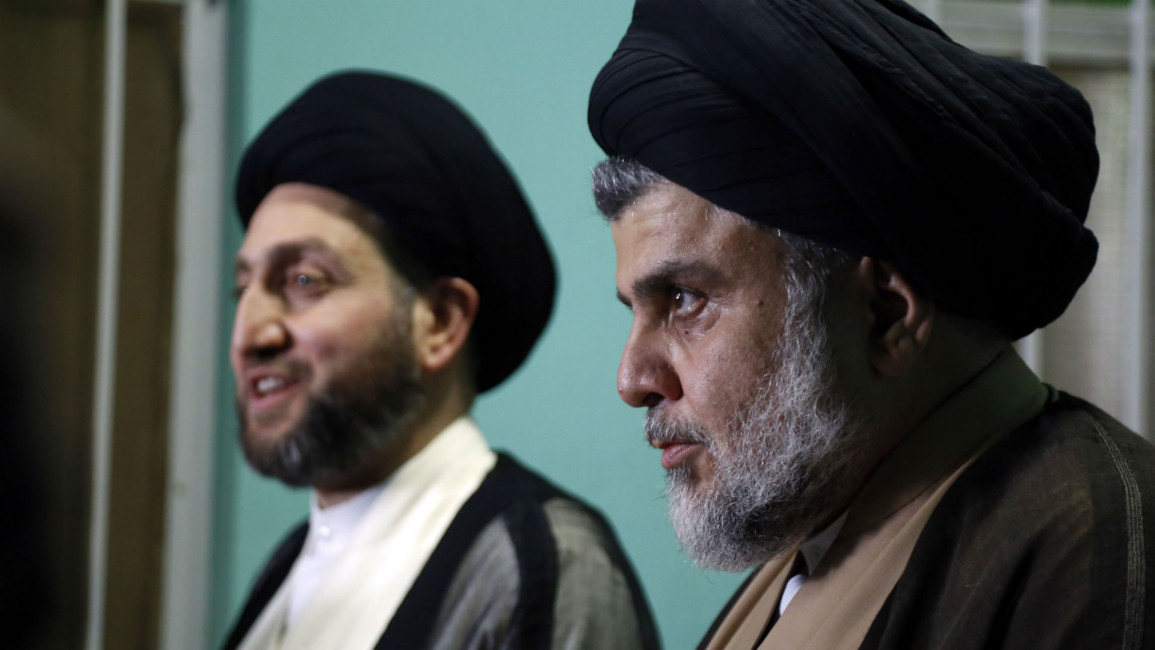Cleric Muqtada al-Sadr named winner of Iraq election
Cleric Muqtada al-Sadr named winner of Iraq election
A political bloc headed by cleric Muqtada al-Sadr has been named as the lead coalition following the Iraq election.
2 min read
Sadr has become a key figure in Iraqi elections [AFP]
Iraqi cleric Muqtada al-Sadr's coalition has been named as the lead bloc in last week's national election, in one of the biggest shake-ups of the country's political system in recent years.
Sairoon - a surprise alliance between the Sadrist Movement and Iraqi Communist Party - were tipped to win the election after earlier counts but now confirmed to have won 54 seats in parliament, the electoral committee confirmed early Saturday.
Sadr had campaigned on an anti-graft platform and promised to end foreign interference in the country.
Iran is the dominant foreign political and military power in the country and has been a target of Sadr throughout his campaign.
Tehran hit back sending al-Quds Force commander Qassem Soleimani to Baghdad and vowed it would not accept Sadr's win.
Sadr responded to the news tweeting: "Reform is victorious and corruption is diminishing."
Despite his win, Sadr cannot - and said he does not wish to - be made prime minister, as he did not run for election.
It is expected that there will be months of political bargaining to form a government, which some analysts predict could result in current Prime Minister Haider al-Abadi staying on as premier with Sadr's bloc dominating the cabinet.
Abadi's Nasr ("Victory") coalition came in a disappointing third, while a pro-Iran Hashd al-Shaabi militia party are the second biggest bloc with 47 seats.
The election was marked by a low turnout and hundreds of thousands of Iraqi refugees unable to cast their vote.
Sairoon - a surprise alliance between the Sadrist Movement and Iraqi Communist Party - were tipped to win the election after earlier counts but now confirmed to have won 54 seats in parliament, the electoral committee confirmed early Saturday.
Sadr had campaigned on an anti-graft platform and promised to end foreign interference in the country.
Iran is the dominant foreign political and military power in the country and has been a target of Sadr throughout his campaign.
Tehran hit back sending al-Quds Force commander Qassem Soleimani to Baghdad and vowed it would not accept Sadr's win.
Sadr responded to the news tweeting: "Reform is victorious and corruption is diminishing."
Despite his win, Sadr cannot - and said he does not wish to - be made prime minister, as he did not run for election.
It is expected that there will be months of political bargaining to form a government, which some analysts predict could result in current Prime Minister Haider al-Abadi staying on as premier with Sadr's bloc dominating the cabinet.
Abadi's Nasr ("Victory") coalition came in a disappointing third, while a pro-Iran Hashd al-Shaabi militia party are the second biggest bloc with 47 seats.
The election was marked by a low turnout and hundreds of thousands of Iraqi refugees unable to cast their vote.



